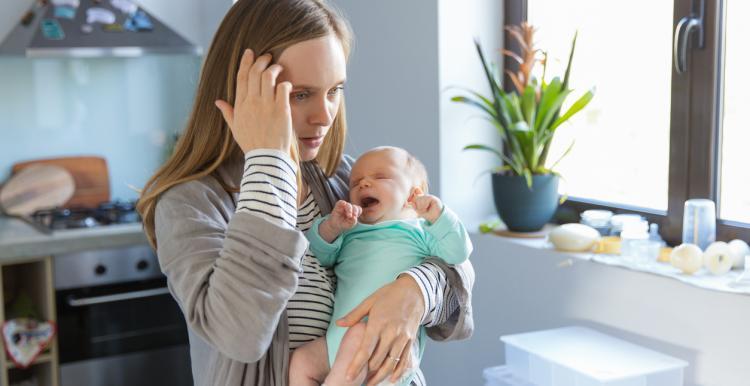Healthwatch England research: Six-week postnatal checks are failing many new mothers

As part of their review of maternal mental health care, the patient champion has analysed experiences of pregnancy and post-natal care since April 2020, shared by 2,693 new mothers and birthing parents from across England.
The analysis suggests that not all GP practices comply with the requirement to provide six to eight-week postnatal checks. And where those checks take place, it is not clear that GP practices are aware of NICE guidance which tells them in detail how to spot mental health problems and provide help.
Healthwatch is now calling for improved consistency of postnatal six-week checks, monitoring of their delivery, and boosting support for GPs to provide quality mental health care for new mothers.
Key findings
- The experiences of 2,693 new mothers and birthing parents were reviewed in a deep dive analysis of maternal mental health support in England.
- Over one in 10 women (16%) of new mothers and birthing parents who shared their experiences said they hadn’t received the six to eight-week postnatal check, which NHS England established in 2020 to make sure new mothers feel well and are recovering properly.
- Of those who received the six-week checks, only one in five (22%) said they were satisfied with the time their GP spent talking to them about mental health.
- Nearly half (44%) of all respondents felt that the GP did not spend enough time talking to them about their mental health, while a third, 30%, said that their GP didn’t mention this during the check.
- One in seven (15%) said they had had their six-week check over the phone, with many new parents finding it hard to verbalise their mental health struggles and discuss physical issues. In the worst cases, respondents felt the way their mental health issues were discussed was inappropriate and potentially harmful.
Whilst the survey participants were self-selected, their views are likely to reflect those of a significant group of recently pregnant people.
In April 2020, the Government introduced the six to eight-week postnatal check after Healthwatch England shared the experiences of almost 1,800 women on mental health during their journey to parenthood.
General practitioners in England have since been contractually obliged and paid to assess new mothers’ mental health and wellbeing, providing an opportunity for referral to specialist services and additional support. Crucially, the checks must take place separately from a postnatal check focused on the health of the baby.
Healthwatch England undertook this research between October and December of 2022 to find out to what extent mental health support has improved during and after pregnancy.
Their analysis also found the following:
- Two-thirds (1,800) of the women and birthing parents who shared their experiences had struggled with their mental health during and after pregnancy.
- Nearly half of those (41%) received no support to help with their mental health during and post-pregnancy.
- Delays in accessing mental health support can have a devastating impact on new parents, with some reporting they had struggled to leave the house, bond with their child and maintain relationships.
- First-time mothers are particularly vulnerable to developing mental health problems and are less likely to access timely care.
The findings come after the Care Quality Commission warned of a “concerning decline” in women’s experiences with maternity services due to a shortage of frontline staff.
Also, last year, a report by MBRRACE highlighted that in 2020, women were three times more likely to die by suicide during or up to six weeks after the end of pregnancy, compared to 2017-19. This is equivalent to 1.5 women per 100,000 giving birth.
Louise Ansari, National Director at Healthwatch England, said:
"With mental ill health affecting up to a third of new and expectant mums, six-week postnatal checks are key to assessing their wellbeing after the birth. If left untreated, poor mental health can have a devastating impact on new parents and their families.
"Unfortunately, our findings show that although most new mothers and birthing parents are likely to be invited to a postnatal consultation, these are frequently carried out as a tick-box exercise, where mental health is not treated as a priority or not assessed at all.
"Monitoring the delivery of six-week checks should be the first step to ensuring there’s a consistent approach to offering quality mental health support to all new mothers. NHS England should consider what additional support and guidance it can provide to GPs so that the help new parents get is of the best quality.
"We also need to ensure that maternal mental health and peri-natal services continue to remain on the government’s agenda and a priority in workforce planning and funding budgets."
Healthwatch England have made five recommendations to help ensure every new mother and birthing parent receive the six-week check, and that it is of the highest quality:
- Integrated Care Systems should monitor the delivery of six- week postnatal consultations as part of their primary care commissioning responsibilities.
- NHS England should update the GP contract to make clear that mental health reviews at the six-week postnatal check should be part of an open-ended discussion.
- NHS England should update the GP contract to include mention of signposting to specialist and community mental health support services at the six-week week check.
- As part of its Maternity Transformation Programme, NHS England should consider what additional support and guidance it can provide for GPs to have quality conversations about mental health at the six-week postnatal check.
- Deliver the Long-Term Plan commitments on improving access to perinatal mental health services, including through more perinatal mental health outreach clinics around the country.

